Description
Janie Eickhoff Likes Setting All of Her Wheels Spinning: Already a World-Class Cyclist, the Los Alamitos Athlete Takes Her Skill and Versatility to the Ice for Speed Skating
By Robyn Norwood, Oct 9, 1989 – Los Angeles Times
Janie Eickhoff is a 5-foot-2 college freshman who has legs to put you in mind of Bo Jackson, and a repertoire of accomplishments to match.
Janie knows cycling. She became a track cyclist five years ago after a knee injury ended the soccer career she had begun by making the Los Alamitos High School varsity as a freshman. After a year as a competitive cyclist, she was a junior national champion.
“I didn’t decide I liked it until the junior nationals in ’85,” Eickhoff said. “I was convinced then that this was what I wanted to do.”
Since 1985, Eickhoff has climbed the ladder–junior world championships, first-place finishes in senior national championship events. Since August, she has been on a remarkable run, setting an unofficial world kilometer record at the national championships and taking a bronze medal in the points race at the world championships at Lyon, France. This weekend, she won medals in six of her seven events at the NEC World Cycling Invitational in the Olympic Velodrome at Cal State Dominguez Hills. The United States won the championship.
Janie also knows speed skating. She took up the sport about three years ago after hearing other cyclists talk about it as they trained at velodromes. Others, such as Bonnie Blair and Connie Young, had begun their careers as skaters. Eickhoff saw it as a way to complement her riding, a training regimen that would enhance her leg strength and give her a break from the bike.
Last year, she won the national senior women’s short-track speed skating championship at Cleveland.
And watch out, Janie might get to know cross-country skiing this winter.
What Eickhoff can’t do is anybody’s guess
At 19, she is at an age at which most people begin to discover that life’s opportunity is not so boundless after all.
But Eickhoff’s opportunities just keep expanding.
Off the track and the ice, Eickhoff is an unassuming, appealing young woman who occasionally worries that if she doesn’t build her upper body she’ll “look like a dinosaur,”–tiny little arms at the top of sturdy frame.
Once on the track or the ice, she is a competitor so tough that she once came back to race less than an hour after falling to the ice in a false start, splitting her chin open, requiring stitches.
Off in the future, the Olympics wait. Eickhoff would like to make it as a cyclist, and is considered one of the top U.S. prospects for 1992.
Making the Olympics in speed skating would be considerably tougher.
Eickhoff’s legs intimidate even the top skaters–her coach, Barth Levy, says she is probably the strongest skater at almost every competition. But after only three years as a competitive skater, her technique is still raw.
“I’m competing against other people who seem like their second pair of shoes was a pair of ice skates,” Eickhoff said. “It’s frustrating. You train so hard, but they’re more effective and can be just as fast.”
Her success at the world cycling championships has Eickhoff considering whether she should focus solely on cycling. Besides the bronze medal she won in the points race, Eickhoff finished sixth in the match sprint, the classic track race that sets riders against each other in a tedious cat-and-mouse game followed by an all-out sprint to the finish.
Her coaches–Levy and cycling coach Pat McDonough, both of whom she spends hours with on the phone getting long-distance training advice–would each like to see her focus on one sport. If it had to be one, cycling would win.
But with the start of staggered Olympic Games in 1994–winter and summer games will no longer be held the same year–it will become more feasible for an athlete to train in two sports. The temptation will be there.
Cycling experts marvel at what Eickhoff has been able to do with so little training and at such a young age. Eickhoff, herself can’t offer a satisfying explanation.
“I always tried really hard,” she said.
Trying hard makes high-school champions, not world-class cyclists.
“In cycling, I can’t believe it, really,” Eickhoff said. “I’m still not sure how far I can go. Maybe I’ll go a few more years and see where I get to.”
The training is hard, and a little lonely. Eickhoff lived in Pennsylvania to train with McDonough this summer, and last year lived in Cleveland to train with Levy.
But these days she is living at home in Los Alamitos and the routine is built around fall semester classes at Cal State Dominguez Hills, jogging distance from the Olympic Velodrome where Eickhoff works out twice a week. She trains for speed skating at Iceland skating rink in Paramount and runs and cycles more on her own.
Her father, George Eickhoff, accompanies her to the velodrome, changing wheels and timing her laps and sprints. But for coaching, Eickhoff relies on long-distance phone calls to McDonough.
It was Eickhoff’s father, “the hobby-aholic,” Janie calls him, who encouraged her to try cycling after the soccer injury. Her father and brother, Rick, have both been on the U.S. pistol shooting team, and George also has raced cars. He took Jane to the velodrome to see if it would interest her. It did.
And by the way, Janie knows pistol shooting, too. Her father says she was a natural.
Eickhoff’s success in cycling and speed skating is because of her versatility. She’s also a sprinter who also has endurance and cunning.
She does well in cycling events whose demands, according to one cycling promoter, are as varied as those of the 100 meters and the mile in track.
Eickhoff delights in the strategy of racing, of outsmarting and then outsprinting opponents on the banked slopes of a velodrome.
“You might not be the fastest, but if you can get across the line first by drafting or suckering someone into doing something, you can win,” she said.
In the match sprint, Eickhoff says, the more experience, the better.
“That’s the most important thing, to have a bigger bag of tricks.”
In the kilometer, tricks are not the issue. The race is an all-out, three-lap sprint considered by some to be the toughest event in cycling–and worthy of the nickname “killer-meter.”
At the national championships in August at Redmond, Wash., Eickhoff finished first in the kilometer with a time of 1:13.81, .425 seconds faster than the world record held by Soviet Erika Salumiae. But the event wasn’t internationally sanctioned, so the time was unofficial.
Eickhoff’s versatility helps her succeed in competitions, but it makes for a lot of luggage.
Both she and her father drive vans equipped with racks, filled with all variety of wheels and frames.
“That’s why I like skating,” Eickhoff said. “You can fit everything into one bag. You don’t have to carry suitcases and suitcases around. Maybe I should have gone into something like running.
“No, that would have been much too simple.”
************************
Bar Augusto
Bar Augusto, located in Alme (Bergamo), Italy, was renowned for its support of cycling teams and its world-class bicycle racing collection that focused on trophies and race-worn jerseys. A family-owned business, the bar, and its attached inn flourished in the 1970s and 1980s. Augusto Gotti, the enterprise’s face, welcomed amateur national teams to stay at Bar Augusto while the riders trained and raced in the region. Many Western and Eastern Bloc national teams embraced the Gotti family’s welcoming spirit and were among the most ardent supporters.

Bar Augusto 1966
Augusto Gotti (Center) with Edy Schütz (Left), Luxembourg National Champion and winner of the 1966 Tour of Luxembourg, and an unknown third person pictured in the interior of the famous watering hole.
Augusto was a devoted cycling fan and astute collector of jerseys. Active and retired professional and amateur riders gave the bar hundreds of jerseys, and all hung with pride on the walls of the storied bar. The jersey collection read like a venerable who’s who of the cycling world from the 1950s through the 1980s. Coppi, Gimondi, Motta, Merckx, Anquetil, Van Looy, Altig, and hundreds more professional jerseys hung alongside the best of the best Eastern Bloc riders. Given its incredible diversity, depth, and breadth, it would be challenging, if not impossible, to build the same collection today.
With time, Augusto decided to retire, close the bar, and enjoy a more relaxed pace of life in his autumn years. A year or so before Augusto passed away, and with the help of former Polish and US National Team Coach Eddie Borysewicz, we were honored to acquire the Gotti Collection. Augusto’s and our collection combined beautifully, and between the two, there were only two overlapping items: an Eddy Merckx maillot jaune and a Bernard Hinault Renault team jersey. To this day, our collection is what is thanks in no small measure to a quaint bar and inn tucked into a picturesque valley in Northern Italy.
By Brett Horton, Jan 2021
***********************
Each jersey is one of a kind; please look carefully at the photos to determine the condition.
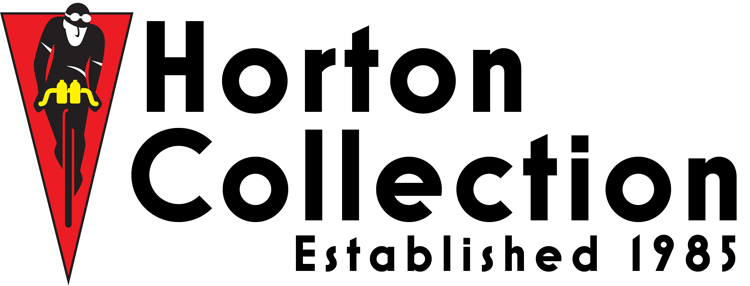
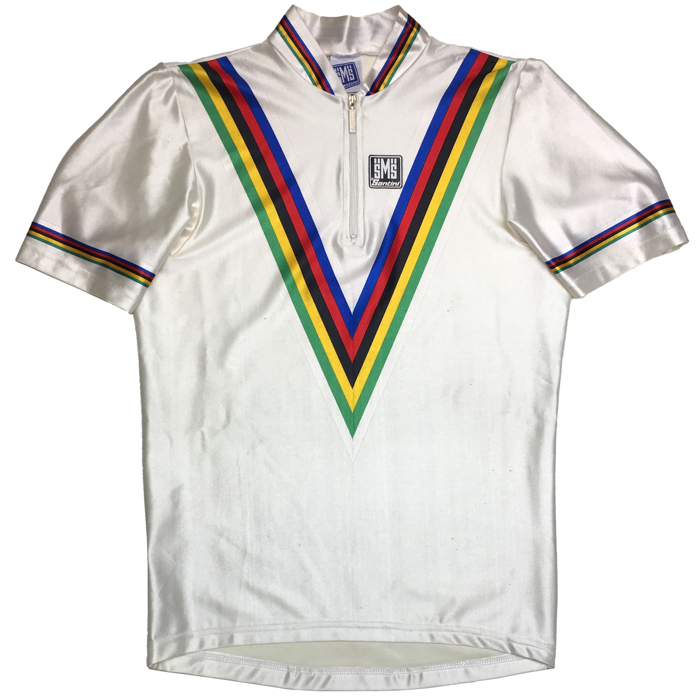
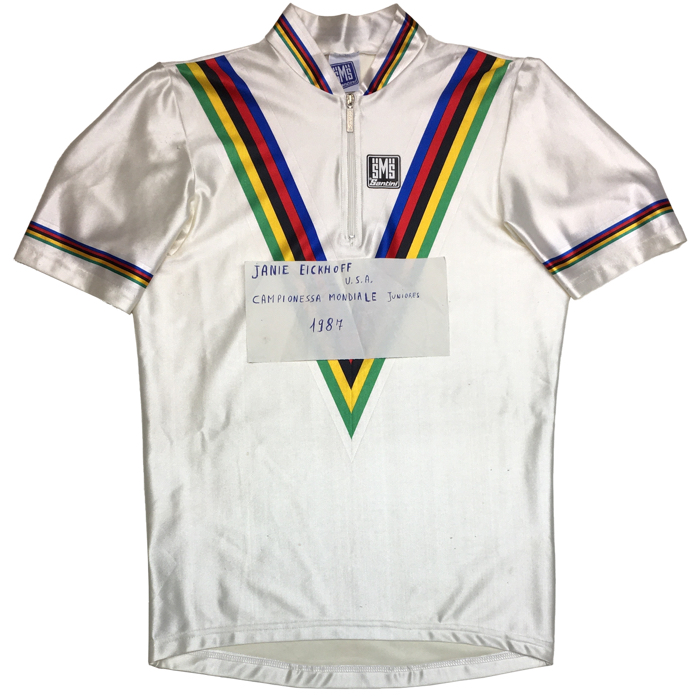
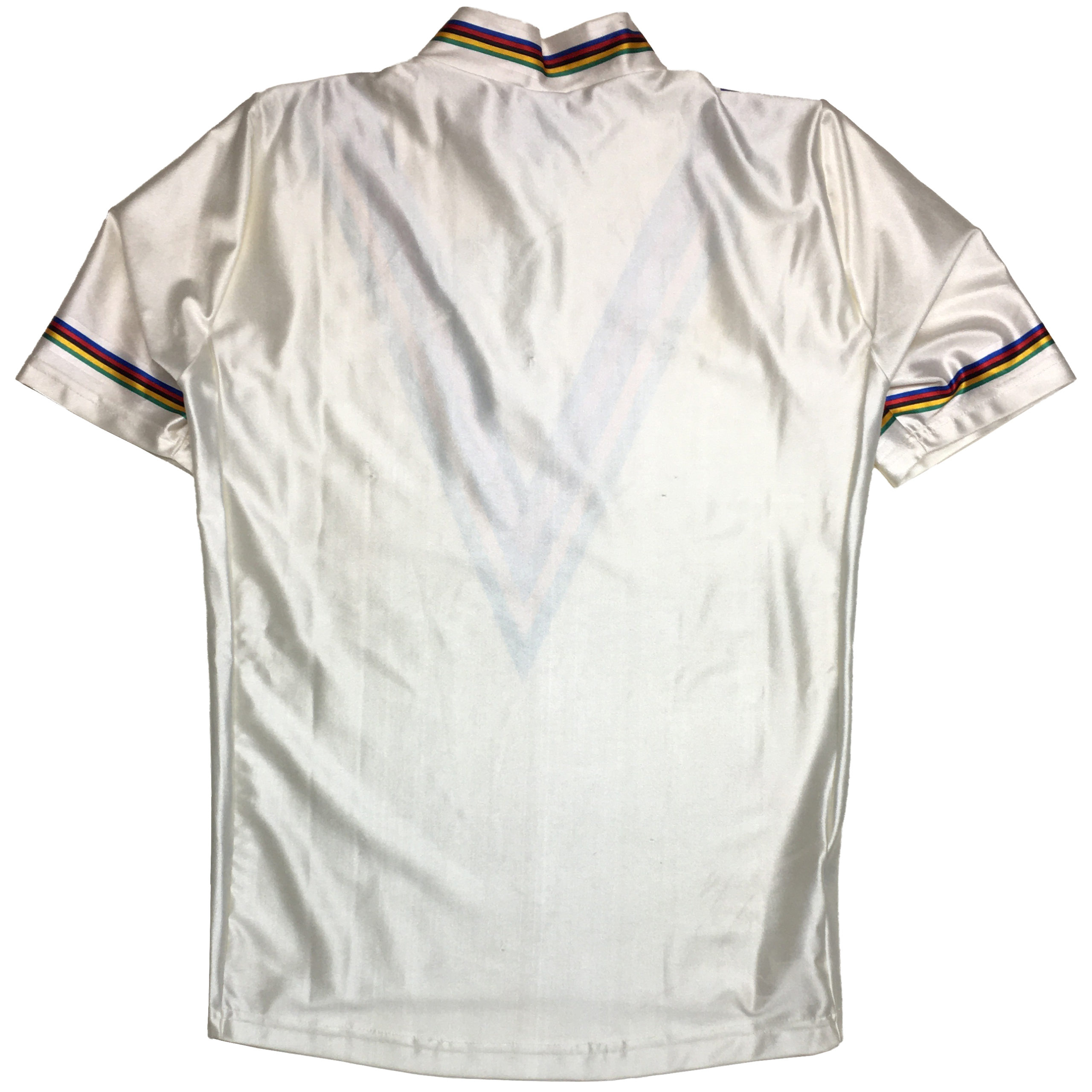
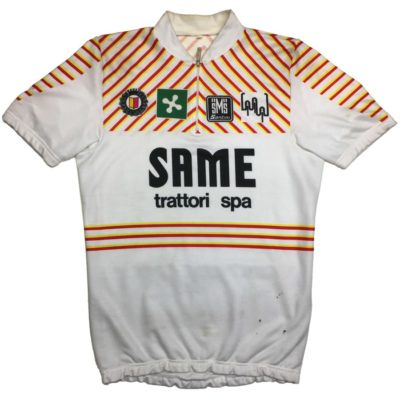
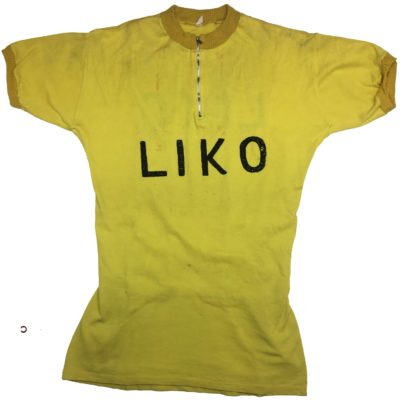
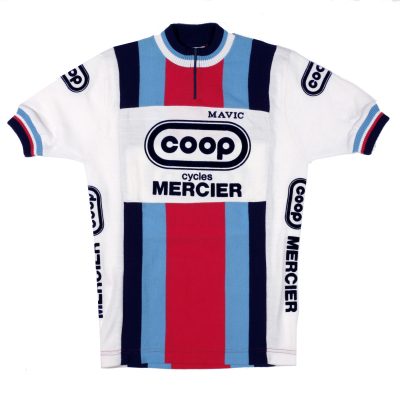
Recent Comments